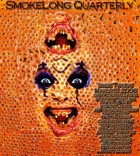A story about Philly’s voice. When did you first hear his voice?
I’ve heard Philly’s voice as long as I can remember. It begins as a singing voice, the voice of someone who has a dream, or is trying to achieve someone else’s dream—and then, wham, all of a sudden life comes along and does something that stops the dream or scrambles it. You can’t sing anymore, because when you open your mouth the voice that comes out has an awful scratch in it. But now you have a choice. Either you throw in the towel or else you take the hit and find some other path to travel. In the end, this path may lead to something as good or even better than the original dream.
Tell us more about this x-ray machine. Does it really exist? How did it end up in your story?
At one point in time it existed in every Stride Rite store, and part of the sales pitch was to have every kid put his feet in it so the salesman could do this quasi-medical “examination” of the foot bones. These bones did indeed glow green and people really thought they were getting the benefit of the latest in scientific shoe-fitting. This device helped give Stride Rite a pediatric image with parents. Needless to say, you don’t see these spiffy-looking x-ray consoles in the Stride Rite stores of today. But it was a perfect apparatus for my story, because the day Philly goes for new shoes is a happy day, a celebration, and new shoes are his reward. The pinnacle moment is when he puts his feet into the machine and gets that glow. But the glow is really life throwing a curve ball at the speed of light—and at the time it’s impossible to know that or avoid it.
Shoes have interesting figurative connotations. “Walk a mile in someone else’s shoes.” “Big shoes to fill.” “The shoe on the other foot.” “Waiting for the other shoe to drop.” And we all know what big shoes mean, yes? Big socks. What do shoes mean for you?
In a general sense, shoes are the vehicles that get us where we’re going when we use our feet for travel, since most of the time we don’t go barefoot. Both Ally and Philly are on a journey, but they’re in very different places on the road. Needing shoes is one of the things they have in common, so the shoe perspective is a useful way to connect their stories and shape their dialogue. Beyond that, their tastes in shoe brands and styles are wonderfully different. Just looking at what’s on their feet, in a short piece like this, gives you a better sense of what their faces are doing than pages of description about eyes, noses, smiles and frowns.
Your work has appeared in some of the top literary journals in the world. What’s been the key to getting your work out there and published?
When you work in reporting and advertising you learn very quickly that your stuff isn’t precious and rejection is as normal as breathing. You also get accustomed to people looking over your shoulder at everything you do—nothing is private, it’s just out there for people to like or dislike. Transfer this mindset to the literary realm and you have a modus operandi for writing and submitting stories. That’s not to say I don’t experience bruising disappointment when one of my creations gets turned down by form letter—but it’s not a dealbreaker, not a reason to stop trying and sending things out.
Newspaper reporter, sandwich man, olive packer, and advertising creative director—these jobs are about as varied as can be. What has this dissimilar experience brought to your writing?
It’s hard to live in an ivory tower when some foreman is yelling at you to dump the olives onto the conveyor belt faster, or when some editor is yelling at you to dump the words onto the page faster because the deadline is minutes away. But even more important than discipline is the rich and varied material you get from doing different things and interacting with all kinds of people. Without content, a writer starves. Some are brilliant enough to invent it from scratch. But me—I have to take real-life experiences as my starting point. What I have to do then is break them like eggs, work them over and bring them into a new dimension—as stories that arc and track on the printed page, have some universal relevance and bear scant or no resemblance to what actually happened to me—or else it wouldn’t be fiction and wouldn’t be deserving of a reader’s time.



 The core workshop of SmokeLong Fitness is all in writing, so you can take part from anywhere at anytime. We are excited about creating a supportive, consistent and structured environment for flash writers to work on their craft in a community. We are thrilled and proud to say that our workshop participants have won, placed, or been listed in every major flash competition. Community works.
The core workshop of SmokeLong Fitness is all in writing, so you can take part from anywhere at anytime. We are excited about creating a supportive, consistent and structured environment for flash writers to work on their craft in a community. We are thrilled and proud to say that our workshop participants have won, placed, or been listed in every major flash competition. Community works.